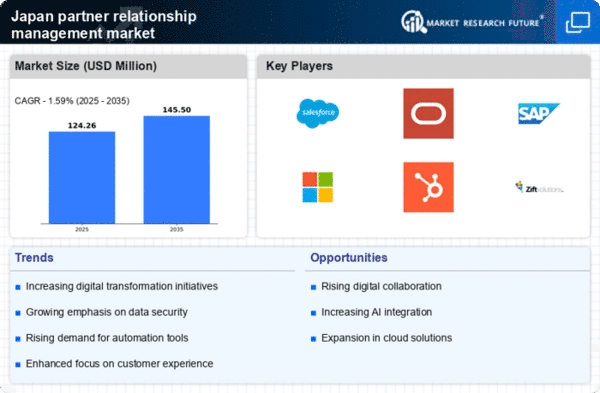Emphasis on Enhanced Customer Experience
In Japan, the partner relationship management market is significantly influenced by the increasing emphasis on delivering superior customer experiences. Companies are recognizing that effective partner management is crucial for enhancing customer satisfaction and loyalty. By optimizing partner interactions, businesses can ensure that customers receive consistent and high-quality service. This focus on customer experience is likely to propel the market forward, as organizations invest in tools that enable better collaboration with partners. The market is expected to reach a valuation of approximately $1 billion by 2026, underscoring the importance of strategic partner relationships in achieving customer-centric goals. As firms prioritize customer experience, the partner relationship-management market will continue to evolve, adapting to the changing needs of consumers.
Growing Demand for Digital Transformation
The partner relationship management market in Japan is experiencing a notable surge in demand driven by the ongoing digital transformation across various sectors. Organizations are increasingly recognizing the necessity of adopting advanced technologies to enhance collaboration with partners. This shift is reflected in the market, which is projected to grow at a CAGR of approximately 12% over the next five years. Companies are investing in digital tools that facilitate seamless communication and data sharing, thereby improving operational efficiency. As businesses strive to remain competitive, the integration of digital solutions into partner management strategies becomes essential. This trend indicates a robust future for the partner relationship-management market, as firms seek to leverage technology to foster stronger partnerships and drive innovation.
Regulatory Compliance and Risk Management
The partner relationship management market in Japan is increasingly shaped by the need for regulatory compliance and effective risk management. As businesses navigate complex regulatory landscapes, they are compelled to establish robust partner management frameworks that ensure adherence to legal requirements. This necessity is particularly pronounced in industries such as finance and healthcare, where compliance is critical. Companies are investing in partner relationship-management solutions that provide transparency and accountability, thereby mitigating risks associated with partnerships. The market is projected to grow as organizations seek to enhance their compliance capabilities, with an estimated growth rate of 10% over the next few years. This trend highlights the importance of integrating compliance considerations into partner management strategies.
Rise of Strategic Alliances and Partnerships
The partner relationship management market in Japan is witnessing a rise in strategic alliances and partnerships as companies seek to leverage complementary strengths. This trend is particularly evident in technology and manufacturing sectors, where collaboration can lead to innovation and market expansion. Organizations are increasingly forming partnerships to enhance their product offerings and reach new customer segments. The market is expected to benefit from this trend, as businesses recognize the value of strategic collaborations in driving growth. With an anticipated market size of $800 million by 2025, the partner relationship-management market is likely to see increased investment in tools that facilitate effective management of these alliances. This shift underscores the evolving nature of partnerships in the Japanese business landscape.
Technological Advancements in Communication Tools
Technological advancements in communication tools are significantly impacting the partner relationship management market in Japan. The proliferation of digital communication platforms enables organizations to interact with partners more efficiently and effectively. As businesses adopt these technologies, they are likely to enhance their partner engagement strategies, leading to improved collaboration and productivity. The market is projected to grow as firms invest in innovative communication solutions that streamline interactions with partners. This trend is indicative of a broader shift towards leveraging technology to optimize partner relationships. With an expected growth rate of 11% over the next few years, the partner relationship-management market is poised to benefit from the ongoing evolution of communication technologies.

















